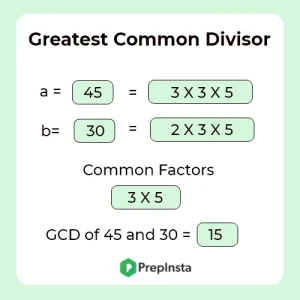GCD of Two Numbers in C++
C++ Program to find the GCD of two numbers
Here, in this section we will discuss GCD of two numbers in C++. GCD (Greatest Common Divisor) of two numbers is the largest number that divides both numbers.
Example : The GCD of 45 and 30 will be :
Factors of 45 are 3 X 3 X 5
Factors of 30 are 2 X 3 X 5
Common factors of 45 and 30 are : 3 X 5 , So the required GCD will be 15

Various Methods to calculate the GCD
- Using Prime Factorization,
- Euclid’s Algorithm,
- Lehmer’s GCD algorithm
Method 1
For a user input n1 & n2.
- Use a for loop linearly traversing such that (i <= num1 || i <= num2)
- Find max i value such that both n1 and n2 are divisible by i
- (num1 % i == 0 && num2 % i == 0)
C++ Code (Method 1)
#include<iostream>
using namespace std;
int main()
{
int n1 = 18, n2 = 45, gcd = 1;
for(int i = 1; i <= n1 || i <= n2; i++) {
if(n1 % i == 0 && n2 % i == 0)
gcd = i;
}
cout<<"The GCD is "<< gcd;
return 0;
}
// Time complexity : O(N)
// Space complexity : O(1)
Output
The GCD of 18 and 45 is: 9
Method 2
Euclidean Algorithm (also known as repeated Subtraction) is used for this method
- Euclidean Algorithm: GCD of two numbers remains constant even if we subtract the smaller number from the higher number.
Below is an example of a manual calculation that you can understand before moving ahead with the code.
C++ Code (Method 2)
#include<iostream>
using namespace std;
// Using Euclidean Algorithm (Repeated Subtraction)
int main()
{
int n1 = 104, n2 = 24, gcd = 1;
while (n1 != n2)
{
if (n1 > n2)
n1 -= n2;
else
n2 -= n1;
}
cout<<"The GCD : "<<n1;
return 0;
}
Output
The GCD: 8
Method 3
Euclidean Algorithm (also known as repeated Subtraction) is again used for this method
This method has two changes –
- Uses recursive approach
- Also, handles if one of the numbers is 0
m > n
m = m – n = 104 – 24 = 80
now m = 80, n = 24
m = m – n = 80 – 24 = 56
now m = 56, n = 24
m = m – n = 56 – 24 = 32
now m = 32, n = 24
m = m – n = 32 – 24 = 8
now m = 8, n = 24
Since, m < n
Now, we will need to change subtraction order.
n = n – m = 24 – 8 = 16
now m = 8, n = 16
n = n – m = 16 – 8 = 8
now m = 8, n = 8
m = n. So, stop. GCD = 8
C++ Code (Method 3)
#include<iostream>
using namespace std;
// Using Recursive Euclidean Algorithm (Repeated Subtraction)
int calcGCD(int n1, int n2)
{
// Takes care of the case n1 is 0
// We have given explanation above
if (n1 == 0)
return n2;
// Takes care of the case n2 is 0
// We have given explanation above
if (n2 == 0)
return n1;
// base case
if (n1 == n2)
return n1;
// n1 is greater
if (n1 > n2)
return calcGCD(n1 - n2, n2);
// n2 is greater
return calcGCD(n1, n2 - n1);
}
int main()
{
int n1 = 45, n2 = 18;
int gcd = calcGCD(n1, n2);
cout<<"The GCD is : "<<gcd;
return 0;
}
Output
The GCD is : 9
Method 4
Euclidean Algorithm (also known as repeated Subtraction) is again used for this method
This method has two changes –
- Reduced number of subtraction
- Modulo operation helps us achieve these reduce subtraction
C++ Code (Method 4)
#include<iostream>
using namespace std;
// Improved the time complexity in comparision to repeated subtraction
// Done by efficient usage of modulo operator in euclidean algorithm
int calcGCD(int a, int b)
{
return b == 0 ? a : calcGCD(b, a % b);
}
int main()
{
int n1 = 45, n2 = 18;
int gcd = calcGCD(n1, n2);
cout<<"The GCD is: "<<gcd;
return 0;
}
Output
The GCD is : 9
Prime Course Trailer
Related Banners
Get PrepInsta Prime & get Access to all 200+ courses offered by PrepInsta in One Subscription
Important Codes related to Arrays
- Find Smallest Element in an Array : C | C++ | Java | Python
- Find Second Smallest Element in an Array : C | C++ | Java | Python
- Find Largest element in an array : C | C++ | Java | Python
- Find the Smallest and largest element in an array : C | C++ | Java | Python
- Calculate the sum of elements in an array : C | C++ | Java | Python
- Reverse an Array : C | C++ | Java | Python
- Sort first half in ascending order and second half in descending : C | C++ | Java | Python
- Sort the elements of an array : C | C++ | Java | Python
- Finding the frequency of elements in an array : C | C++ | Java | Python
- Sorting elements of an array by frequency : C | C++ | Java | Python
- Finding the Longest Palindrome in an Array : C | C++ | Java| Python
- Counting Distinct Elements in an Array : C | C++ | Java| Python
- Finding Repeating elements in an Array : C | C++ | Java | Python
- Finding Non Repeating elements in an Array : C | C++ | Java | Python
- Removing Duplicate elements from an array : C | C++ | Java | Python
- Finding Minimum scalar product of two vectors : C | C++ | Java | Python
- Finding Maximum scalar product of two vectors in an array : C | C++ | Java | Python
- Counting the number of even and odd elements in an array : C | C++ | Java | Python
- Find all Symmetric pairs in an array : C | C++ | Java | Python
- Find maximum product sub-array in a given array : C | C++ | Java | Python
- Finding Arrays are disjoint or not : C | C++ | Java | Python
- Determine Array is a subset of another array or not : C | C++ | Java | Python
- Determine can all numbers of an array be made equal : C | C++ | Java | Python
- Finding Minimum sum of absolute difference of given array : C | C++ | Java | Python
- Sort an array according to the order defined by another array : C | C++ | Java | Python
- Replace each element of the array by its rank in the array : C | C++ | Java | Python
- Finding equilibrium index of an array : C | C++ | Java| Python
- Rotation of elements of array- left and right : C | C++ | Java| Python
- Block swap algorithm for array rotation : C | C++ | Java| Python
- Juggling algorithm for array rotation : C | C++ | Java | Python
- Finding Circular rotation of an array by K positions : C | C++ | Java | Python
- Balanced Parenthesis Problem : C | C++ | Java | Python






Login/Signup to comment